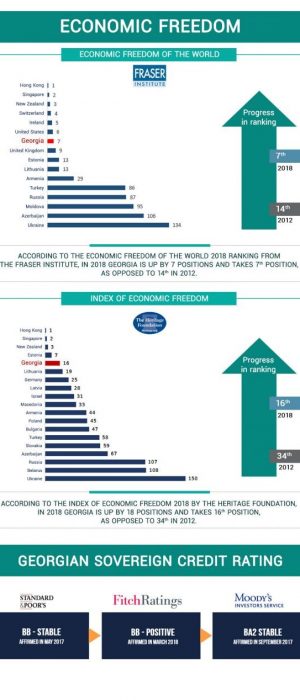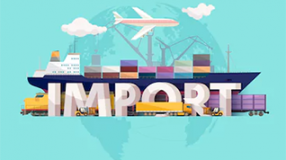Business Freedom (Liberty)

Georgia’s economic freedom score is 76.2, making its economy the 16th freest in the 2018 Index. Its overall score has increased by 0.2 point, with a substantial improvement in property rights offsetting modest declines in government integrity, judicial effectiveness, and fiscal health. Georgia is ranked 9th among 44 countries in the Europe region, and its overall score is above the regional and world averages.
transparency
Georgia has made major progress in combating corruption and has become an international leader in this respect. It remains committed to continuing reforms in this direction, which is crucial for the overall success of the Association Agreement and Georgia’s economic future. These reforms link to the conditions that the EU set for extending visa-free access for Georgian citizens to travel to the EU.
Taxation

In accordance with the Constitution of Georgia, this Code sets forth the general principles of formation and operation of the tax system of Georgia, governs the legal relations involved in the movement of passengers, goods and vehicles across the customs border of Georgia, determines the legal status of persons, tax payers and competent authorities involved in legal relations, determines the types of tax offences, the liability for violating the tax legislation of Georgia, the terms and conditions for appealing wrongful acts of competent authorities and of their officials, lays down procedures for settling tax disputes, and governs the legal relations connected with the fulfilment of tax liabilities.
Resources (energy, workforce, loans,...)
The average monthly salary in Georgia amounts to 410 USD, which includes blue and white collar workers, as well as C-suite employees. The country doesn’t have minimum wage regulations.
Unemployment rate is 12.4%. It is noteworthy, that Georgian labor market offers young workforce – 50% of the unemployed population is in the 20-34 age category. Additionally, no working permits are required and citizens of 94 countries can stay in Georgia without visa during whole 1 year, which helps attracting professional employees from other countries in the wider region.
Georgia has quite flexible Labor Code. According to Heritage Foundation, Georgia has one of the most liberal labor environments not only in the region, but globally and Labor Freedom Index is 75.7 out of 100 score (26th globally).

market

Tariff Policy on Import
Georgia has one of the most liberal and competitive trade regimes across the world. In accordance with legislative changes, since 1 September 2006 tariffs on import decreased from 16 tariff rates to 3 (0%, 5% and 12%). Tariffs on import were abolished on about 85 % of goods.

Tariff Policy on Export
According to the Georgian legislation, export and re-export from Georgia are free from customs duties. Hence, that since 1 September 1997 Georgia imposes value added tax (VAT) based on the principle of country of destination, the export from Georgia is free from VAT.

Licenses and Permits
Based on the Law of Georgia on Licenses and Permits, the legislation does not consider any non-tariff limitations in foreign trade (licenses, quotas, prohibitions and other) except, when restrictions are necessary for healthcare, security and environment protection purposes. Specifically, the following licenses and permits are issued:
ease of doing business
The business sector and especially the Small and Medium-sized Enterprises (SMEs) play an important role in the development of the economy, contributing significantly to the sustainable and inclusive growth. SMEs, having enormous potential in employment generation and job creation, as well as in fostering economic growth, could be considered as a backbone of each country’s economy.
A strong and well-developed SME sector significantly contributes to export, innovation, and creation of modern entrepreneurial culture, playing at the same time a significant role in achieving prosperity in the country. Usually in advanced economies (e.g. those of the European Union (EU) countries) SMEs constitute the overwhelming share of operating enterprises, generate more than 50% of turnover and provide two out of every three jobs in the private sector. In OECD countries, more than 99% of companies are SMEs and generate about two-thirds of GDP on average.


